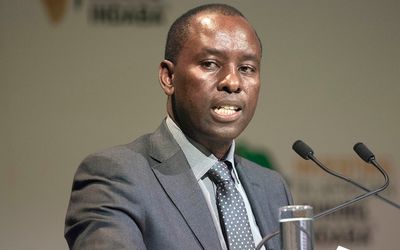IN February, the Financial Mail reported that Mineral Resources Minister Mosebenzi Zwane travelled with a delegation from the Gupta-owned Tegeta Exploration and Resources firm to visit Glencore in Switzerland to negotiate the purchase of Optimum Colliery. This was astounding enough, but actually the backstory was even more telling.
What happened was that resources writer Charlotte Mathews heard on the grapevine about the meeting that took place the previous year.
Charlotte and I have been colleagues for decades, and I know her as a thorough, experienced and dutiful reporter. So, to confirm the rumour, she did what any good journalist would do — she called and e-mailed everybody who might have knowledge of the meeting.
Hence, she contacted the spokesman for Tegeta, Glencore and the ministry, among others.
The most emphatic response came from Tegeta.
Asked if the minister had joined the Tegeta delegation to Switzerland, Tegeta director Nazeem Howa said it was "absolute rubbish".
But then oddly, almost simultaneously, Mathews got a totally different response from Zwane’s office. Yes, he did attend the meeting, the spokesman said, very openly.
Far from being apologetic, Zwane’s spokesman positively relished his role. "Minister Zwane has committed himself to ensuring that his office has an open-door policy. This, in part, requires travelling to meet with all stakeholders to represent government’s position on these pertinent matters. He will continue to do so."
We at the Financial Mail put down both versions, but worked on the basis that a minister of state would not lie about his movements.
In any event, the Sunday Times took up the story and did a full-scale investigation, following flight paths and talking to a broader range of people, putting the issue beyond doubt.
So, surely, you would guess, Howa would contact us to explain how he could have been so wrong.
Actually, he didn’t.
This whole backstory becomes relevant now because the Financial Times, the most cautious and diplomatic of newspapers, reported last week that Deputy Finance Minister Mcebisi Jonas was offered the job of finance minister by a member of the Gupta family shortly before then-finance minister Nhlanhla Nene was given the boot.
The Sunday Times has once again done some sterling work on this allegation, mentioned in passing in the Financial Times piece, and discovered that Jonas was, in fact, not offered the job once, but twice.
The problem is that nobody, not a single soul, is apparently prepared to put their name to the story.
The Gupta brothers, Ajay and Atul, not only deny they were involved, but deny that any meeting ever took place with Jonas.
What does one do with this denial? Our only choice is to try and decide between the conflicting stories by means of patterns of past behaviour and suggestions. This is not confirmation, but it adds grist to the mill.
One part of the pattern is easy. At least once before, a person in the African National Congress (ANC) was told by the Guptas that they had a ministerial job before they were informed officially.
That person was Sports Minister Fikile Mbalula.
Economic Freedom Fighters’ leader Julius Malema said during the recent state of the nation address debate that he was present when his then friend and ANC Youth League comrade got a phone call to say he was the new sports minister — not from the president, but from a member of the Gupta family.
Mbalula tweeted shortly afterwards that this was old news and that it was "part of the public record".
It wasn’t, but who cares, the fact is that Mbalula admitted it.
There is also the question of patterns of behaviour.
The really cutting aspect of the Sunday Times article this weekend was the list of conditions that were put to Jonas: he would have to fire four named people (naturally, some of the very best people in the ministry), and he would have to approve the nuclear procurement programme.
This level of specificity is actually a well-known characteristic of these interactions, it turns out. Score two strikes for the argument that the denial is false.
The point is that blank denials just won’t cut it anymore. With this amount of evidence, circumstantial and otherwise, those claiming the meeting did not happen will need to provide details of their movements and details of who they met, when and where, before the public is going to believe them.
There is no obligation on them to do so.
But then, there is no obligation on us to believe them either.

Mineral Resources Minister Mosebenzi Zwane. Picture: TREVOR SAMSON
IN February, the Financial Mail reported that Mineral Resources Minister Mosebenzi Zwane travelled with a delegation from the Gupta-owned Tegeta Exploration and Resources firm to visit Glencore in Switzerland to negotiate the purchase of Optimum Colliery. This was astounding enough, but actually the backstory was even more telling.
What happened was that resources writer Charlotte Mathews heard on the grapevine about the meeting that took place the previous year.
Charlotte and I have been colleagues for decades, and I know her as a thorough, experienced and dutiful reporter. So, to confirm the rumour, she did what any good journalist would do — she called and e-mailed everybody who might have knowledge of the meeting.
Hence, she contacted the spokesman for Tegeta, Glencore and the ministry, among others.
The most emphatic response came from Tegeta.
Asked if the minister had joined the Tegeta delegation to Switzerland, Tegeta director Nazeem Howa said it was "absolute rubbish".
But then oddly, almost simultaneously, Mathews got a totally different response from Zwane’s office. Yes, he did attend the meeting, the spokesman said, very openly.
Far from being apologetic, Zwane’s spokesman positively relished his role. "Minister Zwane has committed himself to ensuring that his office has an open-door policy. This, in part, requires travelling to meet with all stakeholders to represent government’s position on these pertinent matters. He will continue to do so."
We at the Financial Mail put down both versions, but worked on the basis that a minister of state would not lie about his movements.
In any event, the Sunday Times took up the story and did a full-scale investigation, following flight paths and talking to a broader range of people, putting the issue beyond doubt.
So, surely, you would guess, Howa would contact us to explain how he could have been so wrong.
Actually, he didn’t.
This whole backstory becomes relevant now because the Financial Times, the most cautious and diplomatic of newspapers, reported last week that Deputy Finance Minister Mcebisi Jonas was offered the job of finance minister by a member of the Gupta family shortly before then-finance minister Nhlanhla Nene was given the boot.
The Sunday Times has once again done some sterling work on this allegation, mentioned in passing in the Financial Times piece, and discovered that Jonas was, in fact, not offered the job once, but twice.
The problem is that nobody, not a single soul, is apparently prepared to put their name to the story.
The Gupta brothers, Ajay and Atul, not only deny they were involved, but deny that any meeting ever took place with Jonas.
What does one do with this denial? Our only choice is to try and decide between the conflicting stories by means of patterns of past behaviour and suggestions. This is not confirmation, but it adds grist to the mill.
One part of the pattern is easy. At least once before, a person in the African National Congress (ANC) was told by the Guptas that they had a ministerial job before they were informed officially.
That person was Sports Minister Fikile Mbalula.
Economic Freedom Fighters’ leader Julius Malema said during the recent state of the nation address debate that he was present when his then friend and ANC Youth League comrade got a phone call to say he was the new sports minister — not from the president, but from a member of the Gupta family.
Mbalula tweeted shortly afterwards that this was old news and that it was "part of the public record".
It wasn’t, but who cares, the fact is that Mbalula admitted it.
There is also the question of patterns of behaviour.
The really cutting aspect of the Sunday Times article this weekend was the list of conditions that were put to Jonas: he would have to fire four named people (naturally, some of the very best people in the ministry), and he would have to approve the nuclear procurement programme.
This level of specificity is actually a well-known characteristic of these interactions, it turns out. Score two strikes for the argument that the denial is false.
The point is that blank denials just won’t cut it anymore. With this amount of evidence, circumstantial and otherwise, those claiming the meeting did not happen will need to provide details of their movements and details of who they met, when and where, before the public is going to believe them.
There is no obligation on them to do so.
But then, there is no obligation on us to believe them either.





















Change: 0.83%
Change: 0.93%
Change: 0.95%
Change: 0.73%
Change: 1.91%
Data supplied by Profile Data
Change: 0.58%
Change: 0.43%
Change: 0.83%
Change: 0.00%
Change: 0.56%
Data supplied by Profile Data
Change: 0.18%
Change: 0.04%
Change: 0.11%
Change: -0.07%
Change: -0.12%
Data supplied by Profile Data
Change: -0.06%
Change: 0.51%
Change: 0.26%
Change: 0.34%
Change: 0.99%
Data supplied by Profile Data